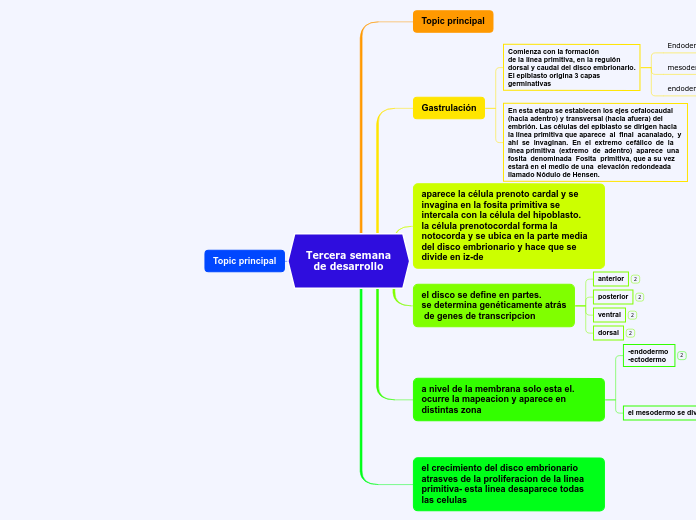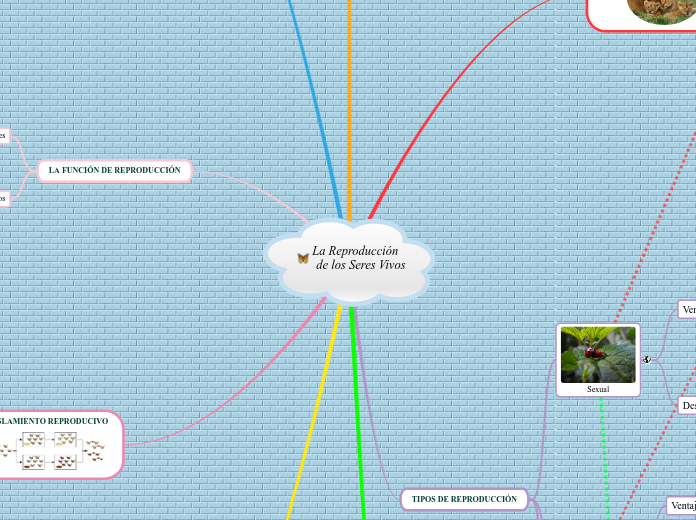Tercera semana
de desarrollo
The part of speech is a category to which a word is assigned according to its syntactic functions. In English the main parts of speech are noun, pronoun, adjective, determiner, verb, adverb, preposition, conjunction, and interjection.
el crecimiento del disco embrionario atrasves de la proliferacion de la linea primitiva- esta linea desaparece todas las celulas
A pronoun is a word that can be used in place of a noun, typically after the noun itself has already been stated.
a nivel de la membrana solo esta el.
ocurre la mapeacion y aparece en distintas zona
An adjective is a word that's used to describe a specific noun and to provide more detail to the listener.
el mesodermo se divide en
Superlative adjectives demonstrate a higher level of comparison between entities.
M. extraembrionaria
M. Lateral
M. intermedio
M. paraxial
-endodermo
-ectodermo
Expresses a comparison between two entities or groups of entities in quality or degree.
He is taller than she is.
el disco se define en partes.
se determina genéticamente atrás
de genes de transcripcion
A noun is defined as a person, place, thing or idea. Proper nouns always begin with a capital letter. Common nouns, which are general words, such as 'cars,' are not capitalized.
dorsal
Compound nouns are words where two nouns have been stuck together to make a new noun. Compound nouns should be written as one word, without a hyphen.
Candlestick
ventral
A noun which refers to a group of things/people.
Family, Class
posterior
Countable nouns are nouns that can be counted, even if the number might be extraordinarily high.
Uncountable nouns are nouns that come in a state or quantity which is impossible to count; liquids are uncountable, as are things which act
like liquids.
Cats, Rain
anterior
Proper nouns are the names of specific people or places. They should always begin with a capital letter.
Create sentences
Mary, Paris
aparece la célula prenoto cardal y se invagina en la fosita primitiva se intercala con la célula del hipoblasto.
la célula prenotocordal forma la notocorda y se ubica en la parte media del disco embrionario y hace que se divide en iz-de
A verb is an action word or 'doing' word that signifies movement in some way.
Gastrulación
A numeral is a word or phrase that describes a numerical quantity.
Some theories of grammar use the word 'numeral' to refer to cardinal numbers that act as a determiner to specify the quantity of a noun, for example the 'two' in 'two hats'.
En esta etapa se establecen los ejes cefalocaudal (hacia adentro) y transversal (hacia afuera) del embrión. Las células del epiblasto se dirigen hacia la línea primitiva que aparece al final acanalado, y ahí se invaginan. En el extremo cefálico de la línea primitiva (extremo de adentro) aparece una fosita denominada Fosita primitiva, que a su vez estará en el medio de una elevación redondeada llamado Nódulo de Hensen.
Comienza con la formación
de la línea primitiva, en la reguión
dorsal y caudal del disco embrionario.
El epiblasto origina 3 capas
germinativas
endodermo
mesodermo
Endodermo embrionario:
Son las primeras células que se invaginan desde el epiblasto, entre los días 14 y 15. Desplazan al hipoblasto y lo reemplazan por una nueva capa, que vendría siendo el endodermo embrionario.
Topic principal







